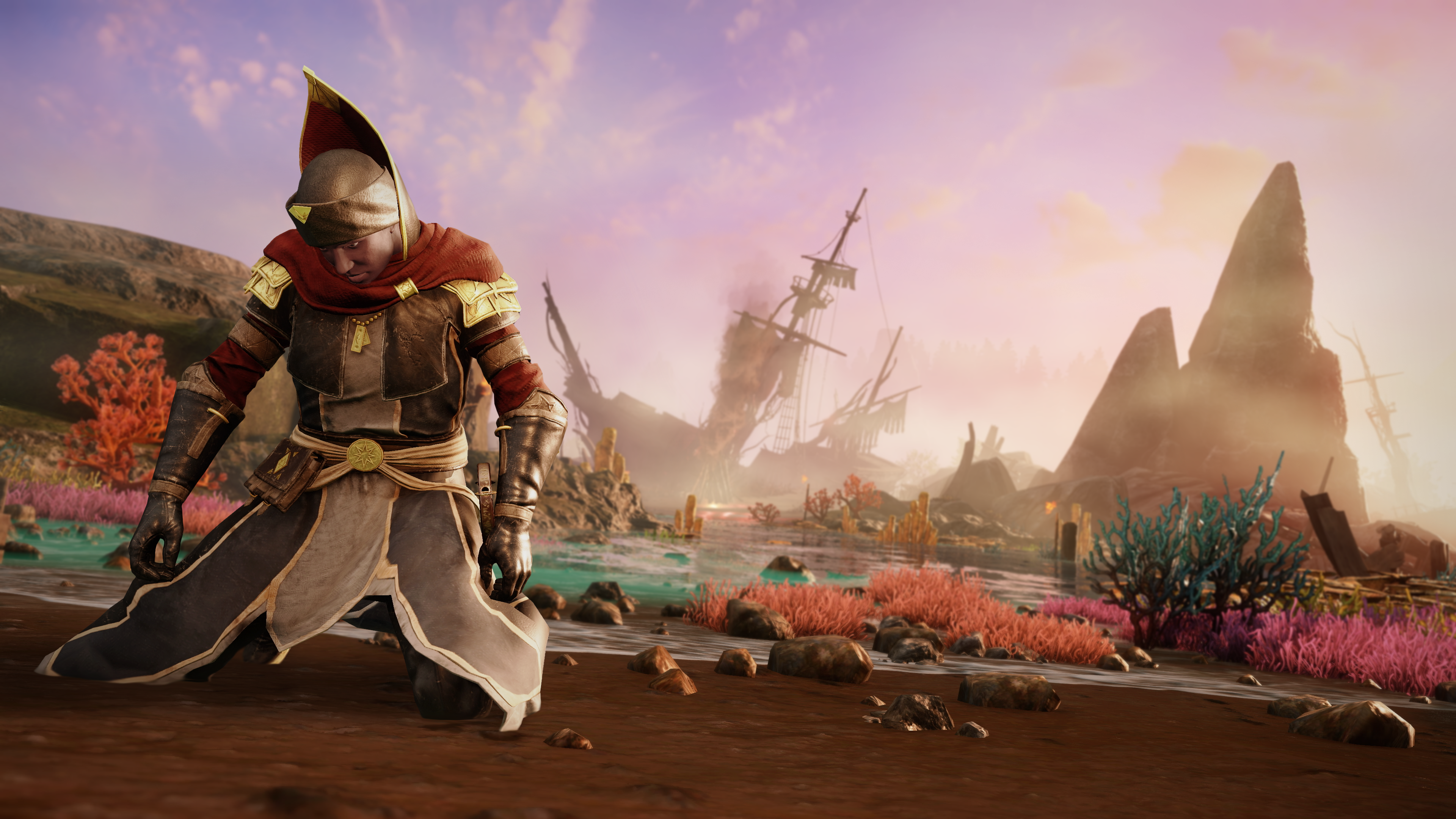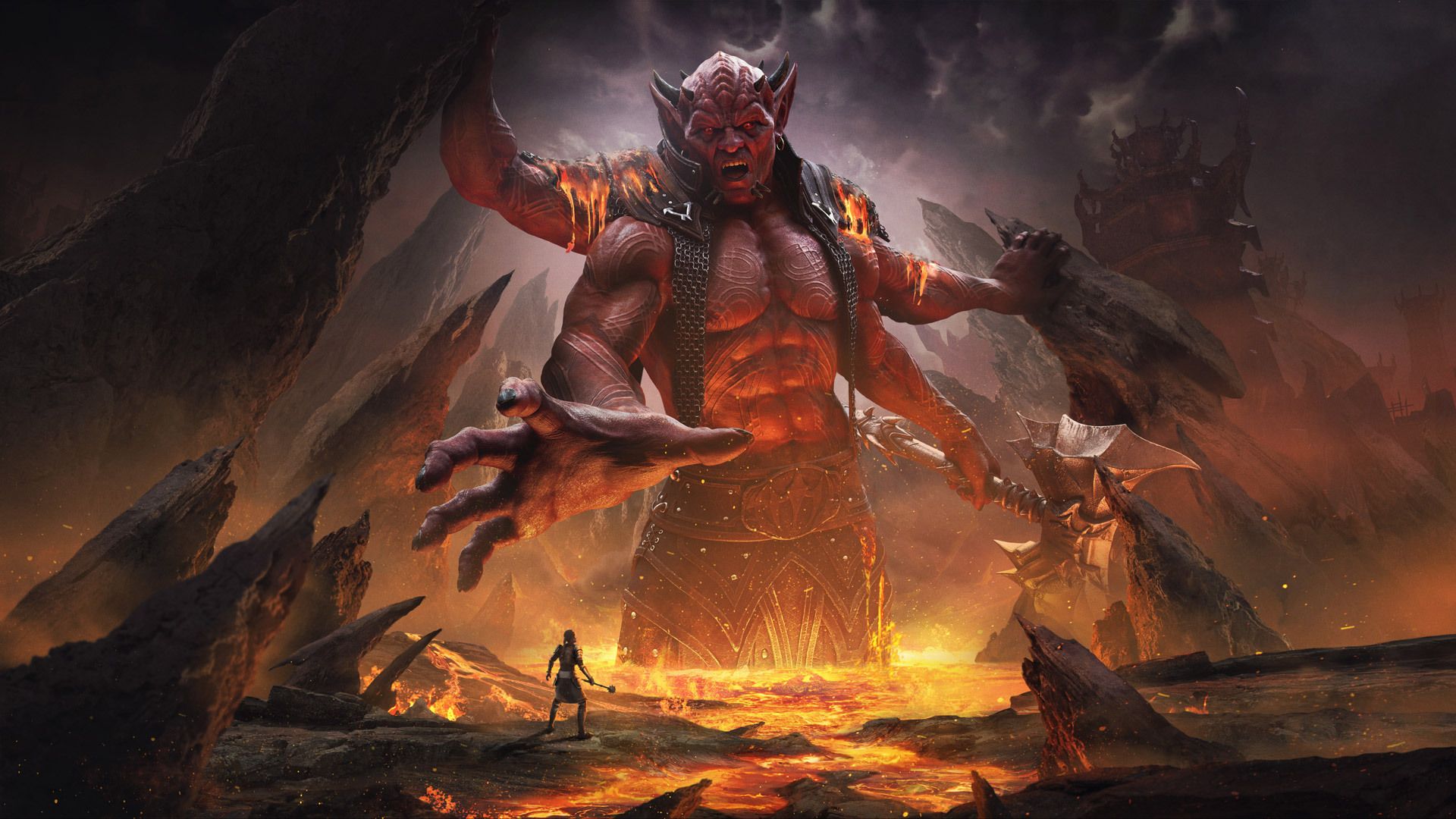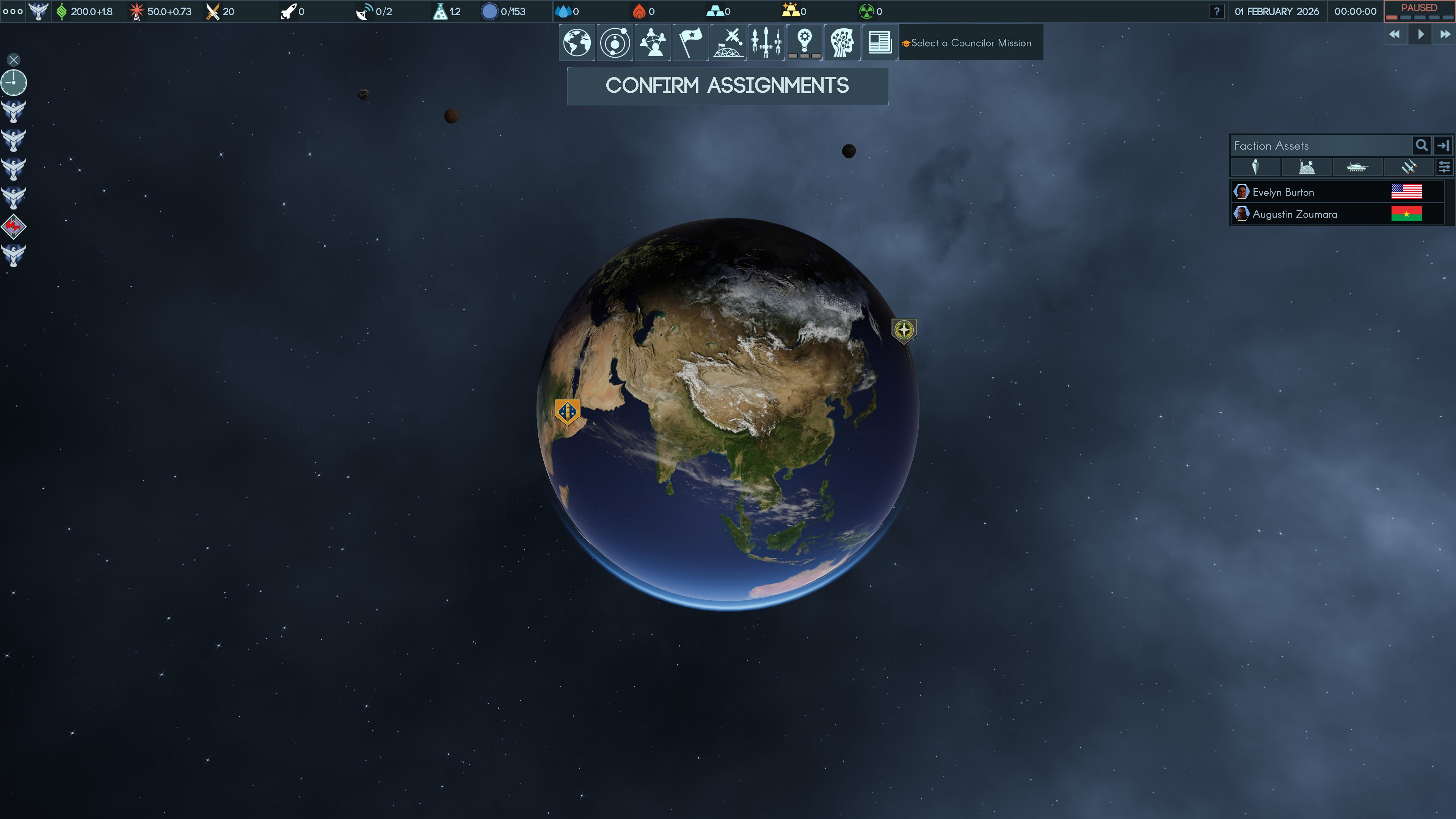New World proved that the hunger for a modern MMO is clearly there—but the only studios with enough cash to make them are too shareholder-brained to try
You can't become a titan if you never get time to grow.

There's a feeling I've been trying to shake off, as I write about MMOs for this very site—that MMOs are a relic of the past. Dying not just to our shared lack of time, but also to an era of player that has aged out of its prior old school tendencies, like the elves sadly getting on a boat for the west. And while part of that's true, the recent spate of MMO news has me wondering if it's entirely our fault no new MMOs are coming out.
Corporate wisdom (which is oftentimes an oxymoron) would have you believe that live services are the new moneymaker (sure, if you hit it big, if you don't, you die) and that MMOs are unsustainable. To be fair to that wisdom, there are nuggets of truth in it. I don't mean to say that MMOs are a sure bet, far from it. MMOs are expensive, require constant maintenance, and competition is fierce because we don't like trying new stuff.
But also, Amazon kinda messed New World up, and its shutdown is more about mismanagement than anything else. Contrary to hindsight, New World is not, on paper, a failed MMO. It did so well on launch that it had Amazon salivating over game development for a minute.
Even when things quietened down, it still wobbled around 10,000 players on Steam (keep in mind it was eventually ported to console, too). Which is pocket change compared to a giant like World of Warcraft, sure, but it is entirely possible to make money from an online game with 10,000 players.
The real question is 'how does Amazon not keep New World profitable?' and the answer is: It probably had no idea what it was doing with it. This is, after all, the company that thought it could compete with Steam just by showing up.
I don't mean to pay lip service to the monetisation models of most MMOs, but the fact is they do work even if they annoy the pants off everybody. Final Fantasy 14 rakes in enough from its cash shop to keep half of Square Enix propped up.
New World, on the other hand, was a buy-to-play game with no subscription and a cash shop that mostly just… sells cosmetics. For a game where you play not a catboy who could really use a maid outfit, but Adventurer McAdventureson.
Keep up to date with the most important stories and the best deals, as picked by the PC Gamer team.
Which I think is the wrong way to go, not ethically, but logistically. As pointed out by our own Fraser Brown back in 2021 with his New World review: "It is an MMO in desperate need of an identity." FF14 gets by flogging cars for the price of full games because people are attached to their catboys—but I cannot possibly fathom why anyone would care what their bland colonial-era lad looks like.
Massively Multiplayer On-Line Must Go Up
I won't dwell on what New World did or didn't do because I also think it might be besides the point: We don't know the exact reason why New World shut down, and I could hypothesise about it all day, but the fact remains that we're in an industry that'd sooner burn piles of money and work than take a modicum of risk, or even just commit resources to a game that's kinda-doing-okay.

We live in an era of constant baffling shutdowns and studio closures that are almost entirely genre-agnostic, but just to stay in the ballpark for a moment: T-Minus Zero was closed by NetEase before it could make a single game, and Greg Street's MMO, Project Ghost, is struggling to get new funding. An MMO that was being developed by Zenimax got shuttered, despite the fact that Xbox head honcho Phil Spencer apparently loved it.
And while I'm certainly about to imply that these executive decisions are stupid, they're not without cause. We are currently in an era of post-capitalist growth and AI bubbles where long-term results matter less than the next time you get to say "look, investors, the line is going up!" Even Phil Spencer, the guy who chose to shut down a promising MMO shooter he loved, understands this is the case.
But once you've got an MMO in place and decently profitable, it can survive on its own power even if it doesn't have the same success as World of Warcraft. I mean, heck—look at Daybreak.
This here's a company that literally exists to keep old MMOs chugging along at a humble tick: DC Universe Online, Dungeons & Dragons Online, Everquest 1 & 2, Lord of the Rings Online—these games aren't blockbuster popular but you can still play them. And while I'm sure there are plenty of issues with how these games are run, the point is Daybreak wouldn't be doing any of this for so long if it weren't making comfortable amounts of dosh.
The games industry at the moment just isn't one that cares about slow, steady management or long-term bets, and that's entirely how MMOs work."
Even if you don't want to just release something and keep it on modest life support, the immutable fact is that MMORPGs are built on investment not just from the players, but from their developers. Putting aside the Blizzard monolith for a moment, games an echelon or so below WoW—your Guild Wars 2s, your Elder Scrolls Onlines—are strengthened tremendously by years of backwards-compatible stuff to do.
Final Fantasy 14's the same: Folks still buy into it because despite all my complaining, it's still a JRPG turducken with five very good singleplayer-able stories layered on top of each other.
You are likely beginning to see the problem. The games industry at the moment just isn't one that cares about slow, steady management or long-term bets, and that's entirely how MMOs work. They're all about investment. You're setting up a foundation that can be used for ten, twenty years, and who in their right mind would sell a foundation to a shareholder?
People want to play new MMOs: Amazon pulled in close to a million players. MMOs are profitable: Plenty of older ones with humble playerbases trundle along just fine. And MMOs are, clearly, worth the investment.
But we're in a tragic karmic cycle of being in an industry where the kind of studios that can fund games like these are completely allergic to actually making them. Not because they wouldn't make cash, but because they wouldn't do so fast enough, and a live-service shooter is probably easier to put on the scrap heap than a big immersive world. Planting a tree in a garden doesn't make the line go up next quarter.
Best MMOs: Most massive
Best strategy games: Number crunching
Best open world games: Unlimited exploration
Best survival games: Live craft love
Best horror games: Fight or flight

Harvey's history with games started when he first begged his parents for a World of Warcraft subscription aged 12, though he's since been cursed with Final Fantasy 14-brain and a huge crush on G'raha Tia. He made his start as a freelancer, writing for websites like Techradar, The Escapist, Dicebreaker, The Gamer, Into the Spine—and of course, PC Gamer. He'll sink his teeth into anything that looks interesting, though he has a soft spot for RPGs, soulslikes, roguelikes, deckbuilders, MMOs, and weird indie titles. He also plays a shelf load of TTRPGs in his offline time. Don't ask him what his favourite system is, he has too many.
You must confirm your public display name before commenting
Please logout and then login again, you will then be prompted to enter your display name.


